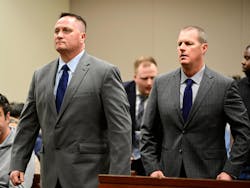CO Paramedics Found Guilty of Criminally Negligent Homicide in Patient's Death
Two Aurora paramedics were found guilty of criminally negligent homicide in the death of Elijah McClain on Friday.
Jurors found paramedic Peter Cichuniec guilty of criminally negligent homicide and assault by drugging. The jury found paramedic Jeremy Cooper guilty of criminally negligent homicide, but not guilty of assault.
Cichuniec also was convicted of a sentence enhancer and was taken into custody after the verdict was read late Friday. Cooper remained free on bail.
Neither paramedic was convicted of the more serious count of reckless manslaughter, but rather the lesser-included charge of criminally negligent homicide, a low-level felony.
The verdict ends three months of back-to-back jury trials in Adams County that resulted in the conviction of one Aurora police officer and the acquittal of two others charged in McClain’s 2019 death. It closes the chapter on a winding four-year saga that followed the 23-year-old unarmed Black man’s death after Aurora police officers violently restrained him and paramedics injected him with a too-large dose of the sedative ketamine.
McClain had committed no crime and was walking home from a convenience store while wearing a ski mask when he was stopped by officers after someone called 911 and said he appeared to be acting strange. His death prompted thousands of people to take to the streets and protest police brutality during the summer of 2020, led the city of Aurora to pay a $15 million settlement to McClain’s parents, gave rise to court-ordered reform within the Aurora Police Department and spurred changes to state law and police training around the use of ketamine. After McClain’s death, six protest leaders were charged with felonies in cases that all were later dropped.
In addition to the two paramedics, three Aurora police officers stood trial earlier this fall in connection with McClain’s death. The officers used a carotid hold on McClain during the Aug. 24, 2019, encounter, squeezing his neck until he lost consciousness. McClain vomited and struggled to breathe after the chokehold, and repeatedly begged for help, telling officers that he couldn’t breathe.
Officer Randy Roedema was convicted of criminally negligent homicide and third-degree assault in October and is set to be sentenced on Jan. 5. Former officer Jason Rosenblatt, who was fired from the Aurora Police Department before he was indicted, was acquitted of criminal charges during the same trial. A jury found Officer Nathan Woodyard, who carried out the carotid hold, not guilty of criminal charges on Nov. 6, and he has returned to work at the police department.
Prosecutors argued during closing arguments in the paramedics’ trial Wednesday that the two men gave McClain an overdose of ketamine that stopped his breathing and ultimately killed him after they failed to properly assess, monitor and treat McClain.
Prosecutor Shannon Stevenson criticized the paramedics for never asking McClain any questions, never touching him before they injected the ketamine and for failing to monitor his breathing after the men injected McClain with the maximum dose of ketamine, a dose much larger than it should have been. She also took aim at the paramedics’ prior testimony in the trial; both took the stand in their own defenses.
“In all the things they said, they didn’t say one single word that reflected any remorse for what happened to Elijah McClain, not one,” Stevenson said. “…They didn’t admit there was anything they could have done better. They expressed zero accountability and zero remorse for their reckless and callous decisions. The decisions that killed Elijah McClain. Their patient.”
Defense attorneys for the two paramedics argued that they were good men caught in the larger systemic failures of racism and policing in Colorado who followed as best they could the right training and protocols in McClain’s treatment, though they were at times hampered by aggressive police officers.
The criminal prosecution was based on political outrage and emotion instead of facts, said Michael Pellow, Cooper’s attorney.
“It’s from the optics that the prosecution asks you to convict Mr. Cooper and Mr. Cichuniec,” Pellow said. “It makes us sick to watch a video and know how it is going to turn out. The sad, terrible ending to it. We all have hindsight at this point. But they didn’t.”
David Goddard, attorney for Cichuniec, said the paramedics genuinely believed McClain was suffering from excited delirium — a disputed condition that describes someone exhibiting extreme agitation to the point where they are a danger to themselves and others. That belief justified the use of ketamine, he said. Prosecutors argued McClain was not experiencing excited delirium.
“The relevant question here is not whether Elijah McClain was suffering from excited delirium, rather the relevant question is whether it was reasonable for these two gentlemen to believe that he was suffering from excited delirium,” Goddard said.
Prosecutor Jason Slothouber said the paramedics “didn’t even try” to properly treat McClain.
“This is not a situation where there is some good faith effort and just, you know, due to their best efforts they made a mistake,” he told jurors. “…They come up and all they do is look at Mr. McClain, ignore every one of his words and immediately make the decision to do the worst possible thing: give him a big overdose of ketamine that he doesn’t need.”
©2023 MediaNews Group, Inc. Visit at denverpost.com. Distributed by Tribune Content Agency, LLC.
